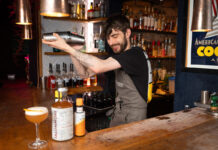
Discerning customers want to learn about the product’s journey from brewer to glass
PROVENANCE has been the watchword of TV chefs and food suppliers for years now, but how important is the concept to the beer world?
‘Crucial’ was the answer across the board from the brewers and drinks firms contacted by SLTN, who said a beer’s story is a unique selling point that can be exploited by operators.
Petra Wetzel, owner of Glasgow-based West Brewery, said there is “no doubt” that consumers’ tastes in beer have become more discerning and suggested an “increase in awareness of ingredients and techniques” could be at the heart of this.
“Not only that, but people who enjoy beer also enjoy the story around how it’s made, the history of the brewery and why certain beers come about,” said Wetzel.
Carlo Valente of Black Wolf Brewery agreed, and said provenance across the entire food and drink sector “is of paramount importance” to consumers, which has also led to changes behind the bar.
“There has been a massive change in attitudes from bar operators regarding the history and background of brands; this is partly due to difficult trading times in the on-trade forcing operators to go the extra mile and the demands from their customers who want to know this information,” he said.
“It is no longer just about dispensing drinks, it’s about selling drinks and creating an opportunity to make more margin and offer something with a point of difference.”
At craft brewer Drygate Brewing Co, operations director Colin Johnston believes story is “one of the most appealing things” about the sub-category, allowing outlets to create a point of difference through their beer range.
“Beer drinkers don’t just want beer that tastes great; they want to know how it tastes great and the journey the beer took from brewer’s imagination to your glass,” said Johnston.
Jeremy Houston, national account manager at Innis & Gunn, said localism was increasingly important.
“There’s a growing focus on craft, craft keg and cask and it’s the local brewers that are seizing the benefits,” he said.
“Publicans are championing ‘on the doorstep’ brewers, because the ‘buy local’ message across food and drink is extremely powerful.”
The world of ‘craft beer’ can be “daunting for customers”, said Isla Mercer, sales and marketing manager at Lerwick Brewery. She advised operators to ensure their bar staff are well informed and able to recommend beers.
“We’ve found operators are very keen to make sure their staff are well-trained on the products they serve and we always offer training to new bars taking in our beers,” said Mercer. “This allows the staff to be enthusiastic about the beers they’re selling which rubs off on the customer too.”
As customers become more knowledgeable about beers, the quality of the products they are buying becomes more important, said Ian Risby, divisional sales manager from McEwan’s Beer Company.
He said: “Although many people are drinking less at the pub, they are prepared to spend more on what they do drink, but will expect a great quality pint in return.
“With more of a focus on quality, we have seen drinkers becoming much more knowledgeable about their beer and curious to try different styles and flavours.”
Kathryn Purchase, director of customer marketing at Carlsberg UK, said publicans need to take a “broad category approach” when presenting the customer with a variety of drinks.
“From big brand lagers to on-trend craft products – it’s important that choice is at the forefront of any outlet’s offering.”
And Allan Cunningham of Delivered Drinks said the visibility of the range is particularly important.
He said: “If you ask most customers, they don’t make their mind up on what to drink until they are standing at the bar.
“This is why presentation is so important. Customers will notice the beers you have on offer if you make them visible.”



















